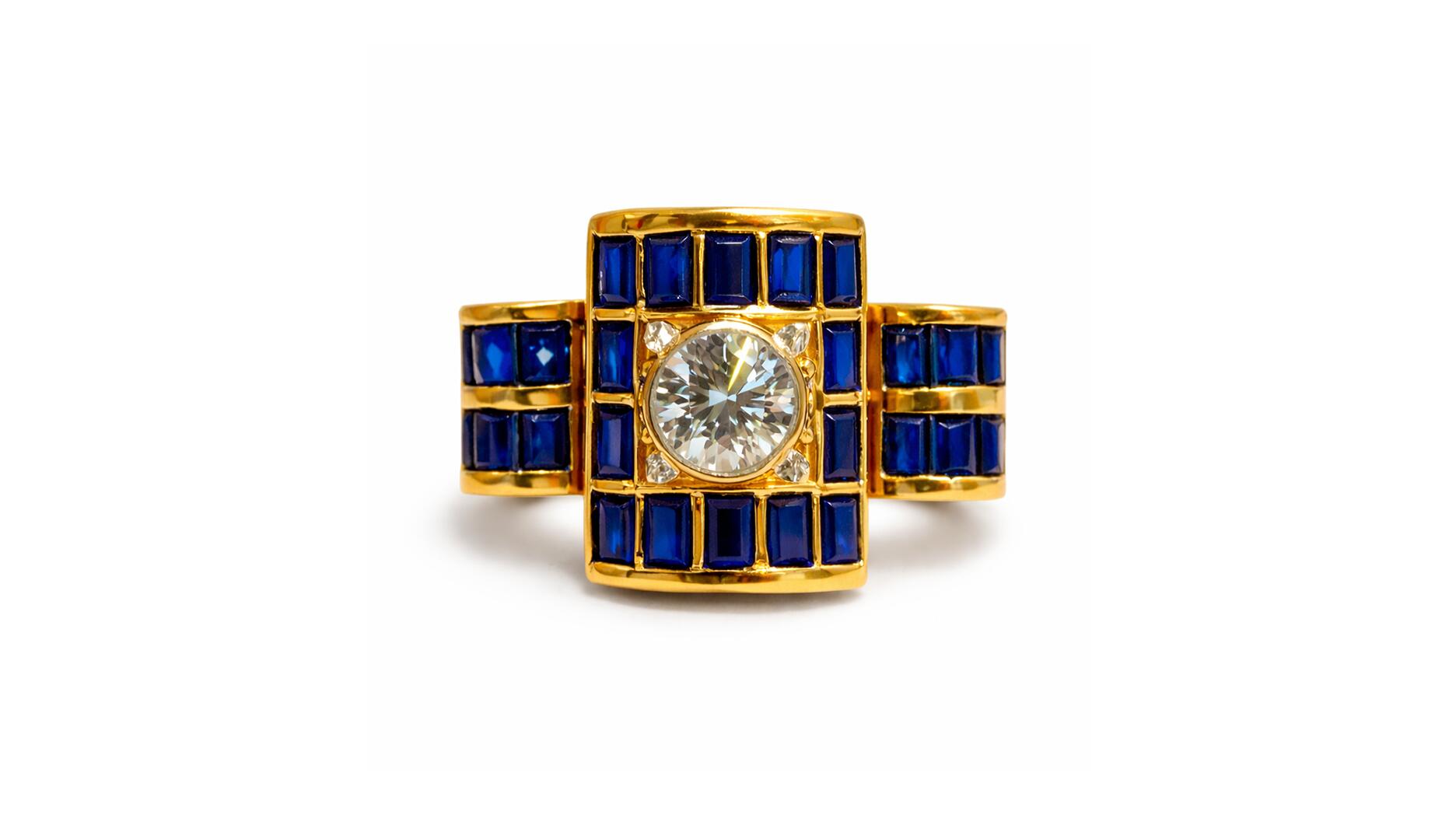State of Jewelry Design: 3 Themes That Will Shape the Next 5 Years
Color, storytelling, and the use of nonconventional materials are the signatures of today’s most innovative and influential designers.

Is it too bold of a statement to make that the jewelry industry is experiencing a renaissance?
If we look back in time, contemplate the present, and then think about what the future holds, there is one thing we know for certain. Jewelry designers have been staying true to one thing—their unique voice.
There is one other thing we know for certain. Jewelry is the most personal of all purchases, an expression of self that we want to carry with us daily.
Jewelry designers have learned to listen to customers’ desires but also, as true artists, have found ways to support their clients’ growing need for “newness” and express their artistic vision at the same time.
A great jeweler is a visionary; trends do not apply to them. They persevere instead through storytelling, the use of innovative and nonconventional materials, and, like all artists, their fascination with color.
These are the themes that have risen to the fore and will continue to dominate the industry for the next five years and beyond.
While these are three distinct categories, they support one another in equal measure and have made watching developments in jewelry design a thrill.
Weaving a Tale
Storytelling can take on many different forms.
With the industry’s acceptance of the fact that we all have a story to tell and there is plenty of room for talent, the jewelry landscape has become richer, more vibrant, and multifaceted.
Storytelling is also the root of experimentation. It is what has led jewelers to seek new ways of expressing themselves and their creations.
Brazilian jeweler Silvia Furmanovich, an intrepid world traveler, creates her collections from the stories, and by the hands, of craftspeople whose heritage is woven into her work.
Each collection has brought to life the art and traditions of Italy, Egypt, Japan, and Brazil.
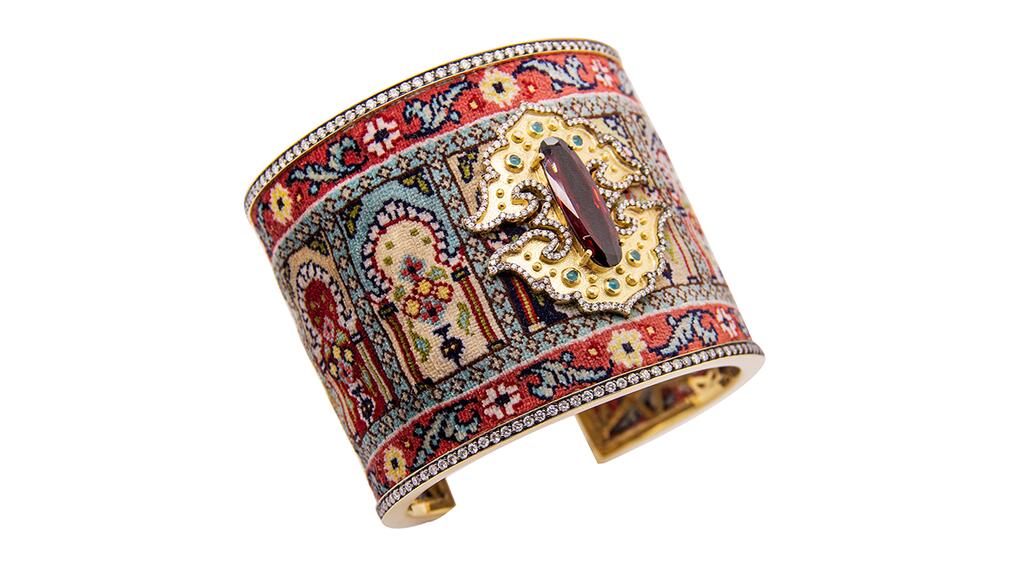
Her most recent body of work was inspired by the Silk Road and focused on Central Asia, where artisans handcrafted jewels that incorporated swatches of traditional suzani, which are hand-embroidered textiles, and ikat, which are dyed textiles.
Furmanovich then integrated these textiles into her designs, which feature bamboo from the Amazon rainforest or wood marquetry.
The designer also is celebrated for her courageous use of color rooted in her Brazilian heritage.
British jeweler Alice Cicolini spent a significant amount of time in India where she learned about the art of meenakari, the Hindi name for champlevé enamel as it is practiced in Jaipur.
Inspired to bring meenakari to the rest of the world, she paired this complex technique with a cornucopia of gemstones to create pieces that are exuberant and joyful.
Her latest exploration of enamel, created in collaboration with London-based enamel master Stanislav Reymer, features marbled motifs on her jewelry.
Inspired by the beautiful multicolored endpapers of books, Cicolini learned that the marbling look could only be achieved using lacquer enamel.
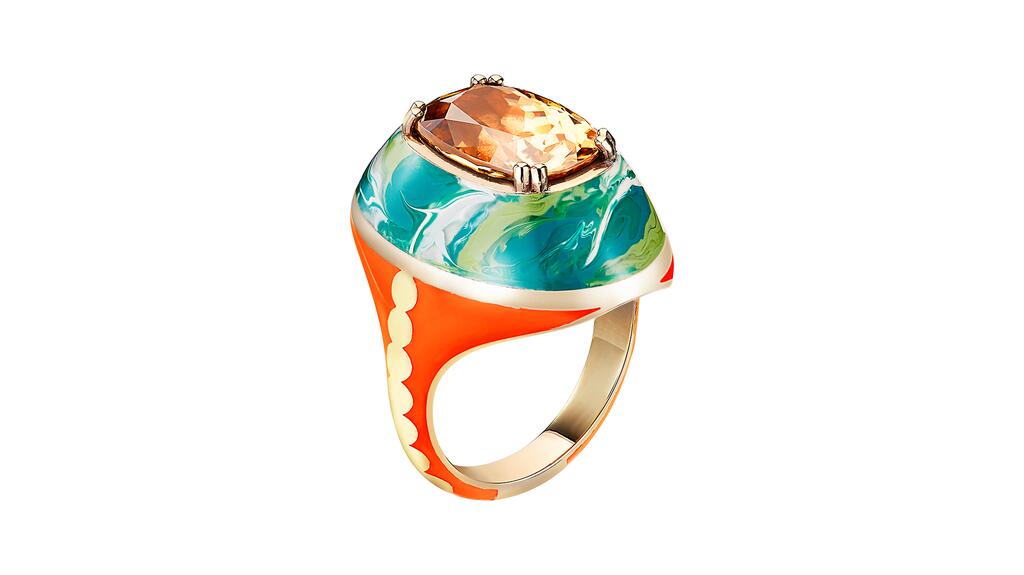
Always eager to experiment, Reymer and Cicolini discovered that since lacquer enamel, unlike vitreous enamel, is not heat fired, the colors don’t mix and therefore it is easier to emulate the swirling pools of color seen on paper.
The marbling effect can be seen in the “High Sari” collection, which was inspired by a pattern Cicolini saw at the Victoria & Albert Museum in London that incorporated classic Indian chintz into a Westernized dress.
In addition to working with enamel, Cicolini sometimes selects stones that are rich in color but not of monetary value.
In fact, less pricey stones like zircons and spinels, which are frequently found in her work, are increasing in popularity among designers who “paint” with stones.
Color Stories
Hong Kong-based jewelry artist Feng J knows her art history.
The Impressionists, with their attention to light, have sparked in her a desire to “layer gemstones like a watercolorist,” she says.
Feng J has created what she calls “floating set” compositions in which the stones look as if they are suspended in midair and the colors are subtle and translucent.
What looks effortless is actually a technical feat.
Double rose-cut stones are set into a lightweight skeletal gold structure allowing light to pass through the stones, similar to what Art Nouveau designer René Lalique achieved with his use of plique-à-jour enamel.
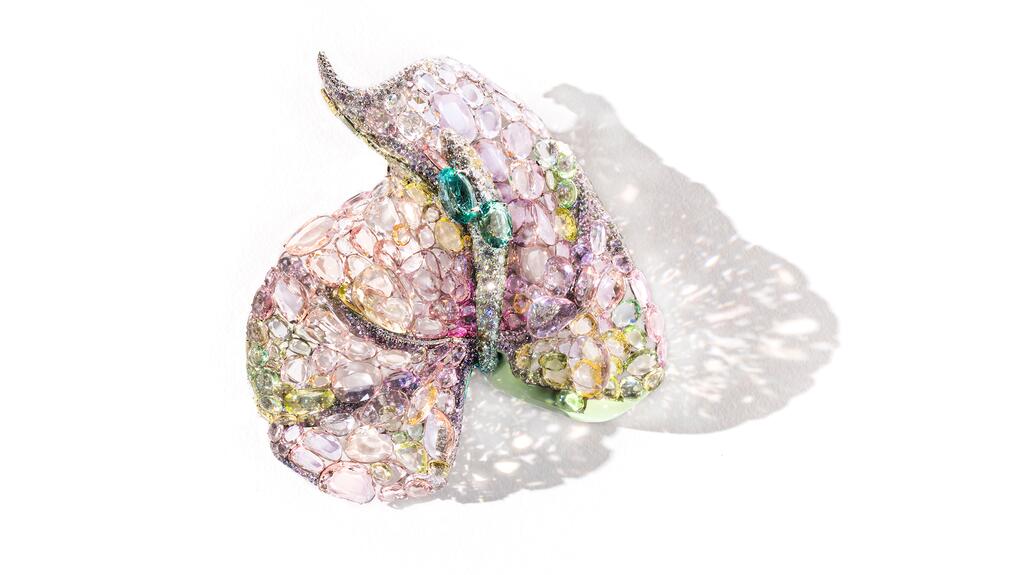
These incredible stones are part of Feng J’s “Colored Gem Bank” of richly hued stones that are, as the designer described it, “cut for beauty and not for yield, resulting in a rainbow array of double rose-cuts, very thin but with many beautiful facets.”
A colored stone that will be featured prominently in design for years to come is peridot, the green-hued gemstone perhaps best known as an August birthstone.
Thanks to Fuli Gemstones, which mines in China’s Changbai Mountains, home to the world’s largest known peridot deposit, there has been an influx in the market.
According to Fuli, the mine produces stones with a grassy green color so vibrant, there is no need for color treatment.
A versatile stone, peridot is used equally in high jewelry and more fashion-forward pieces.
Designer Hu Wenyuan used it for a pop of color, combining it with diamonds and 18-karat white gold in her incredible “Growing” necklace, a collaboration with Fuli Gemstones.
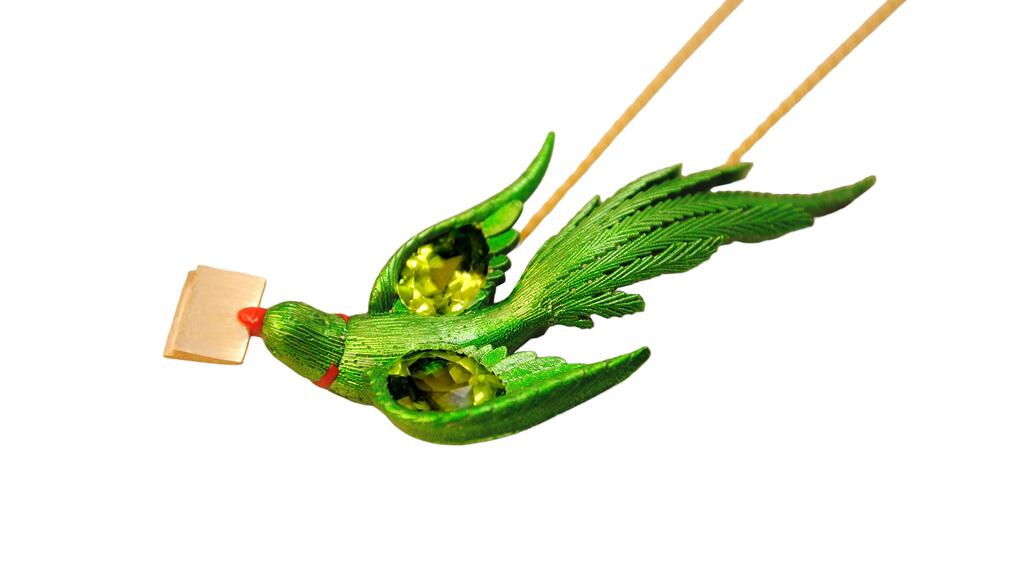
Indian jewelry brand Estaa made peridot a big part of “Kismet the Parrot of Good Fortune,” a pendant in the shape of a green parrot with a nano-green ceramic coating and two pear-shaped peridots on its wings.
The stone is perfect for the emotion this piece is meant to convey—calm.
For many designers, choosing colored stones for their talismanic quality is a high priority.
Los Angeles-based Mexican jewelry artist Daniela Villegas selects stones that are protective and purifying and will have a positive impact on the lives of her clients.
Inspired by the natural world, her bejeweled creatures carry multiple meanings and are made with stones that are just as storied.
The “Ocean Transformation” ring is 18-karat yellow gold with sphene, yellow diamonds, emeralds, and rubies.
Sphene is a stone that comes in green, yellow, or orange and, according to the designer, brings mental clarity and mindfulness, among many other metaphysical benefits.
Villegas says it was the perfect stone for her to use in the design of a fish, which symbolizes rebirth.
New Jersey-based jewelry artist Alexia Connellan, who specializes in one-of-a-kind jewels using rare gemstones, created her masterpiece, the “Phoenix” brooch, using a 28.64-carat Muzo Colombian emerald, 38.5 carats of ombré sapphires and rubies, and 7.5 carats of reverse-set ombré diamonds, and more than 2,200 pavé-set sapphires and rubies, both heated and unheated.
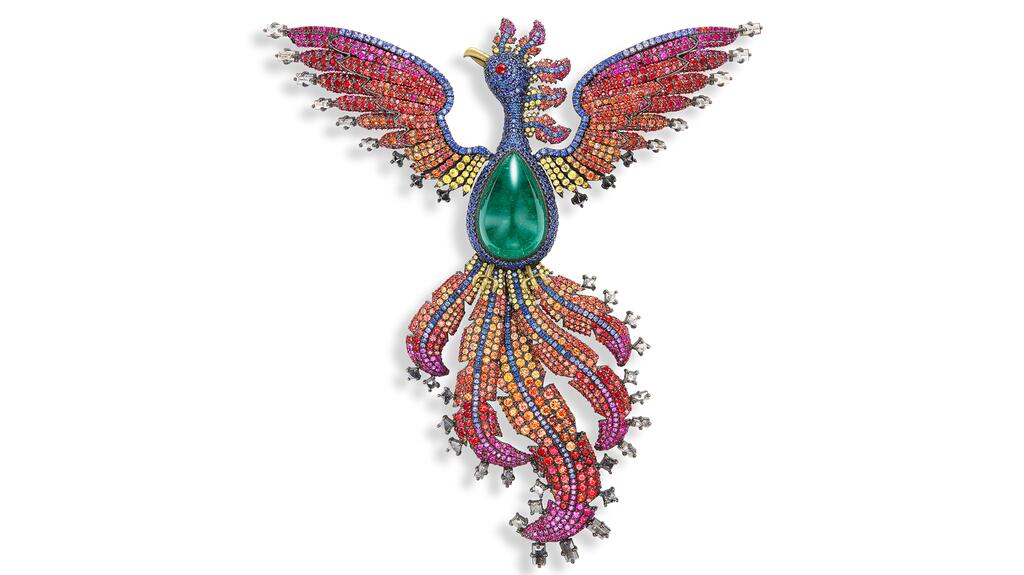
However, for something a bit more casual Connellan has also used sphene, one of the first gems she collected, because it, “has rainbow flashes of dispersion,” she says.
In her “Royal Earrings,” she paired a yellow sphene with an Ethiopian Welo opal and amethyst cabochon. The yellow sphene was set in green gold to bring out more of its color.
As is evident in the market, colored gemstones are increasingly popular right now because they allow designers to be even more creative.
Sometimes, stones are chosen because they complement other materials in the designer’s repertoire.
A great example of this is the high priest of color and innovative materials, and a role model for many designers featured in this article, James de Givenchy.
The creative director of Taffin has been incorporating color into his creations from the start. He was one of the first jewelers to bring ceramic into his designs in 2010.
De Givenchy continues to masterfully embrace ceramics in a rainbow of colors with stones to match and in 2019, introduced Venetian glass in his custom creations, which he has continued to use.
It is exciting to see the wide-ranging approaches that designers take to imbue their work with color.
Los Angeles-based designer Lauren Harwell Godfrey has developed a signature triangle inlay that is seen across her collections for her namesake brand, Harwell Godfrey.
The designer favors large-scale gemstones and saturated colors. She recently looked to Ancient Egypt for inspiration after traveling there, reimagining her design signature for the “Cleopatra’s Vault” collection.
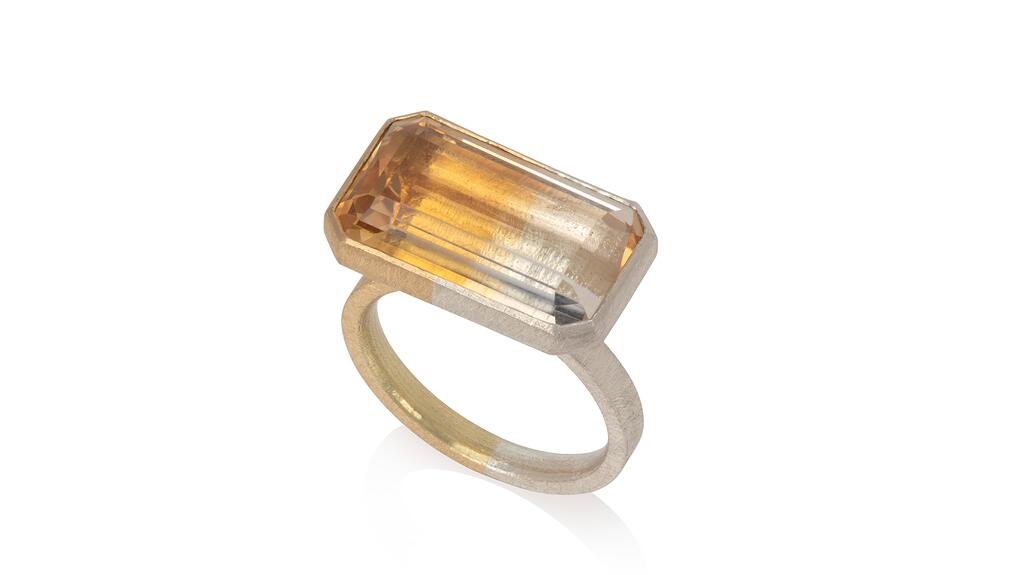
Emerging British jewelry designer Rachel Jones, who in five years should be a household name, plays with color not only in the stones she chooses but also through her alloys.
She pairs colored gemstones with gold that either matches or contrasts with the natural coloring of the stone.
Jones started the practice of making her own gold alloys while a student at London’s Royal College of Art, and it has now become the cornerstone of her brand.
To double down on the use of color, she uses parti stones, gemstones that show more than one color at a time, and matches the gold to the stones, as seen in her parti citrine ring with bi-color citrine-quartz in 9-karat white gold and 18-karat yellow gold.
Precious Is a State of Mind
Playing with metal takes a highly skilled jeweler.
The French jewelry artist Alix Dumas, who creates pieces under the label Maison Alix Dumas, also called MAD Joaillerie, launched her company in 2020 but has been in the industry working under other prominent jewelers since 2012.
In five years, Dumas, like Jones, will need no introduction.
Always looking for a unique approach to her jewels, she works with titanium because, Dumas says, it is lightweight and, more importantly, because color can be added through anodizing.
Dumas has created a series of one-of-a-kind leaves of different shapes and colors. Her purple leaves are titanium with 18-karat gold and sapphires.
A look back to the Art Deco period shows that there is a long history of industrial materials acting as a muse for high jewelry.
New York master goldsmith Sean Gilson is not afraid of using some of these materials. After being in the industry 40 years, having your own point of view is the key to lasting success, he says.
Recently, the goldsmith created a ring with a steel shank made from natural pearls to accompany an opal and colored diamonds.
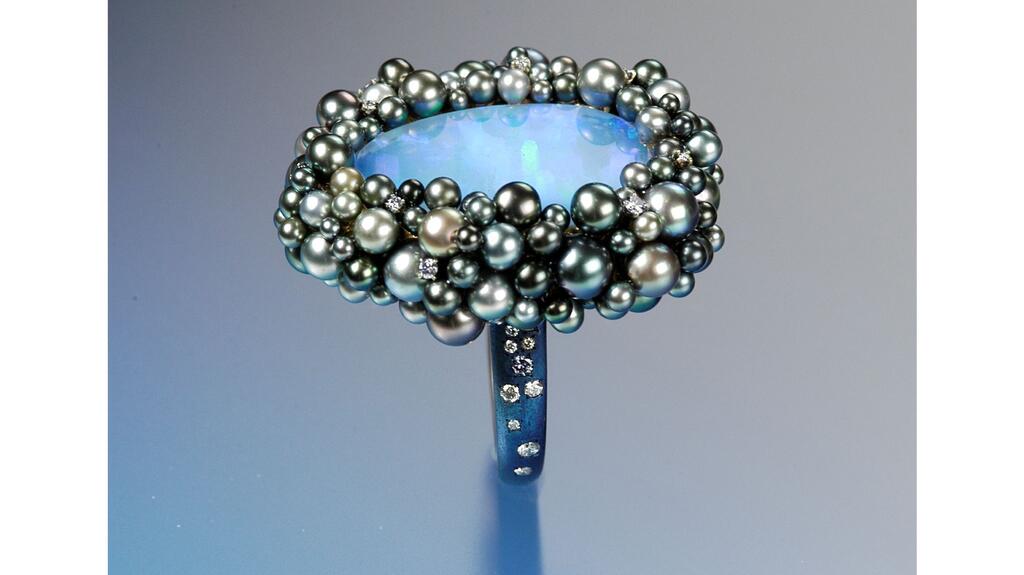
It took him three years to complete the ring because he had to find the right range of natural pearl colors to complement the opal.
The result is black natural pearls surrounding the flat opal and making it look like a pool of water. The band that joins the top element is made of blued steel with diamonds set into it.
Steel is an interesting choice that Gilson made because he could get the color that he was aiming for and appreciated the idea of something so tough being combined with the elegance and softness of the pearls, he says.
The ring is a true masterpiece.
For Gilson, it’s less relevant what materials he uses as long as they can produce the desired effect and the piece meet the needs of the wearer.
When thinking five years ahead, it is important to note that, like Gilson, it can take many years to complete a piece or a collection.
For legendary Munich-based heritage house Hemmerle, it can take decades to get some of its most iconic pieces just perfect.
When it comes to infusing jewelry with color, Hemmerle has shown there are myriad ways to do it.
The brand’s “Infused Jewels” collection was inspired by the natural ingredients of herbal tea.
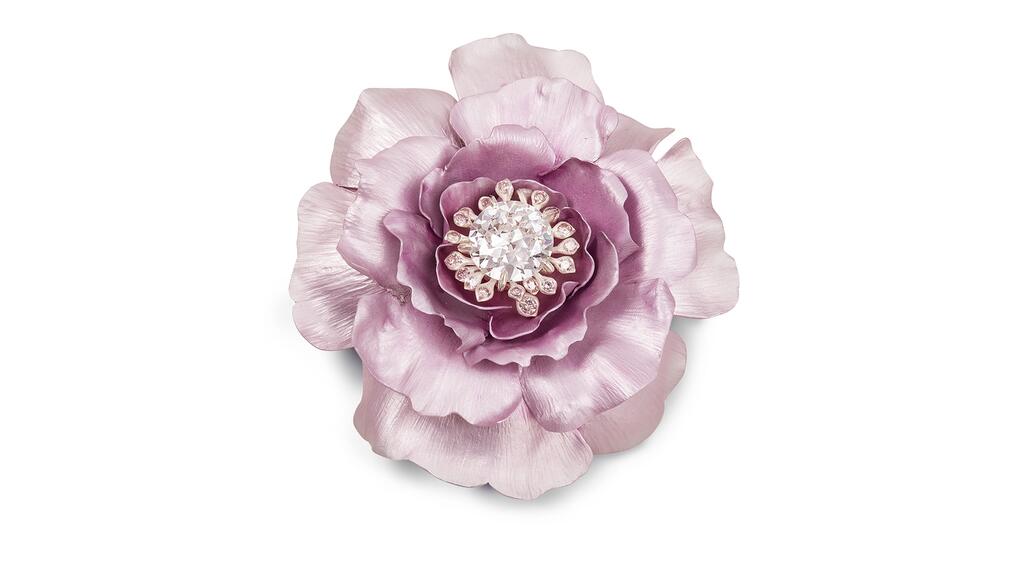
Choosing to work with anodized aluminum, Hemmerle’s craftspeople painstakingly worked to get all the subtle color variations of ginger, lemon balm, rose and lavender just right, producing a collection of 13 pieces—10 earrings and three brooches.
Fourth-generation jeweler Christian Hemmerle once said that materials are the starting point that drive the brand’s creativity.
This is apparent in the house’s use of exquisite stones but also nonconventional metals for high jewelry such as iron, which has been used for their iconic “Harmony” bangle throughout its 30-year history, along with other nonprecious materials like exotic woods, aluminum, copper, bronze, marble, and pebbles from Munich’s Isar River.
Material experimentation extends beyond metals and gemstones.
Pebbles have been featured prominently in high jewelry and are also highly personal.
For his most recent collection, “Fluid,” Brazilian designer Fernando Jorge debuted pieces that featured colored diamonds and precious stones paired with “unexpected, humble materials” such as Brazilian river pebbles, marble, and fossilized amber.
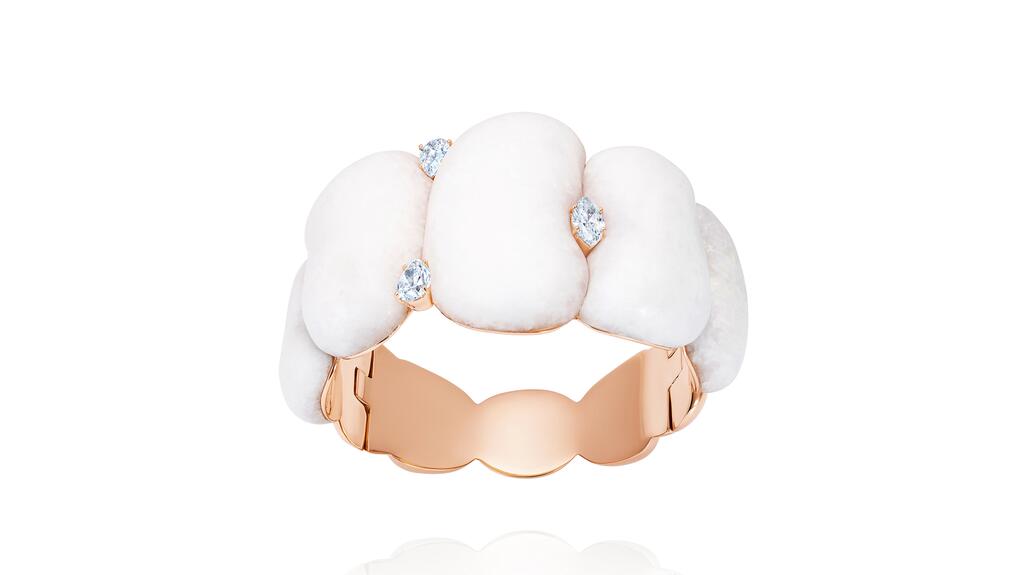
Jorge’s organically shaped earrings, bracelets, and rings are sensual and striking due to this unusual combination of materials.
De Givenchy also used pebbles in his high jewelry more than a decade ago, which is why many are convinced that the use of nontraditional materials will continue to shape design—no pun intended—for the next five years, and beyond.
In fact, using found objects, or objet trouvés, in jewelry dates to the post-World War II era.
And it’s not that, as the adage goes, one man’s trash is another man’s treasure; these relics are a vital part of the story designers want to tell through their jewelry.
In some cases, these objects are the protagonist.
Francesca Ruggiero, the Italian visionary behind the London-based label Kiaia, spends hours researching Greco-Roman coins that form the basis of her one-of-a-kind pieces.
Fascinated with history and archeology, Ruggiero says each piece of jewelry starts with the story of the coin, be it Marc Antony and Cleopatra from 32 B.C. or the Emperor Caracalla bronze coin from A.D. 212-217, which depicts the emperor’s bust on one side and the she-wolf with suckling twins Romulus and Remus, the mythical founders of Rome, on the reverse.
Ruggiero’s clients choose pieces based on the coin’s theme and meaning.
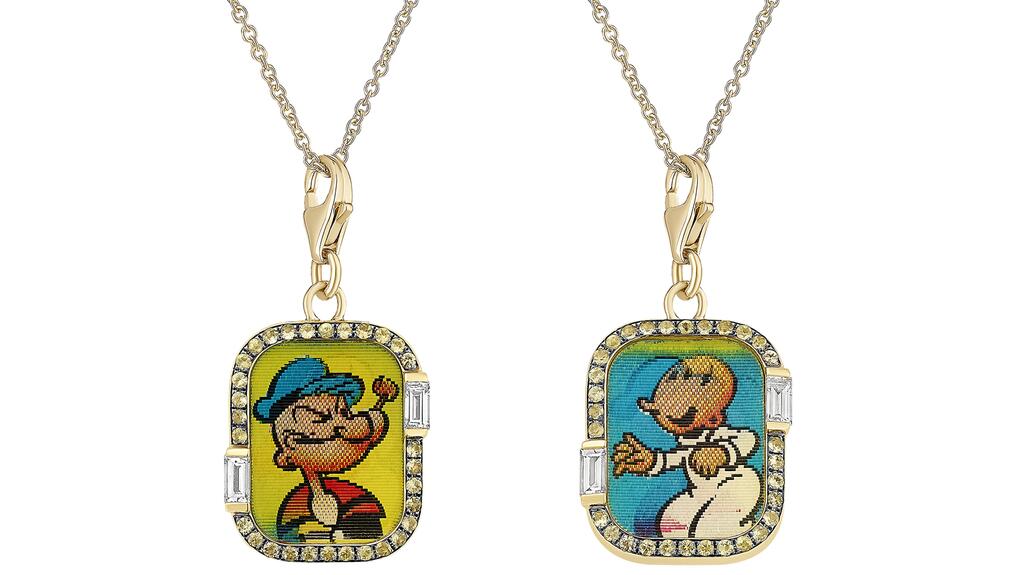
Based in Valenza, Italy, designer Francesca Villa is a passionate collector of antique and vintage finds, ranging from the whimsical to the precious, that are the starting point for her jewels.
A recent series, called “Abracadabra Luxe,” combined rare VariVue lenticular images of superheroes and pop culture icons like Popeye with diamonds, rubies, and sapphires. (Lenticular images give the illusion of depth or appear to move/change depending on the angle from which they are viewed. Children of the ‘70s and ‘80s likely encountered lenticular art in the form of trading cards.)
Already collector’s items, Villa elevated the VariVue lenticulars by setting them in gold, making them even more desirable for those who want to cherish their youth.
Let’s also not overlook the fact that, typically, working with found objects means that no two pieces are alike.
Sometimes, the stories designers choose to tell are their own.
As a teenager, Northern California jeweler Kelsey Simmen was diagnosed with Type 1 diabetes, and her blood sugar fluctuations have become a powerful storytelling tool in her work.
Simmen grows, manipulates, and builds with sugar’s crystalline structures, ranging from delicate sanding sugar to the striking formations of rock candy.
Crystals are grown, molded, and then cast, while waxes are shaped to form bezels around stones.
She even chooses which stones to work with based on their resemblance to actual sugar, including melee lab-grown diamond baguettes, which resemble sanding sugar or sugar bricks.
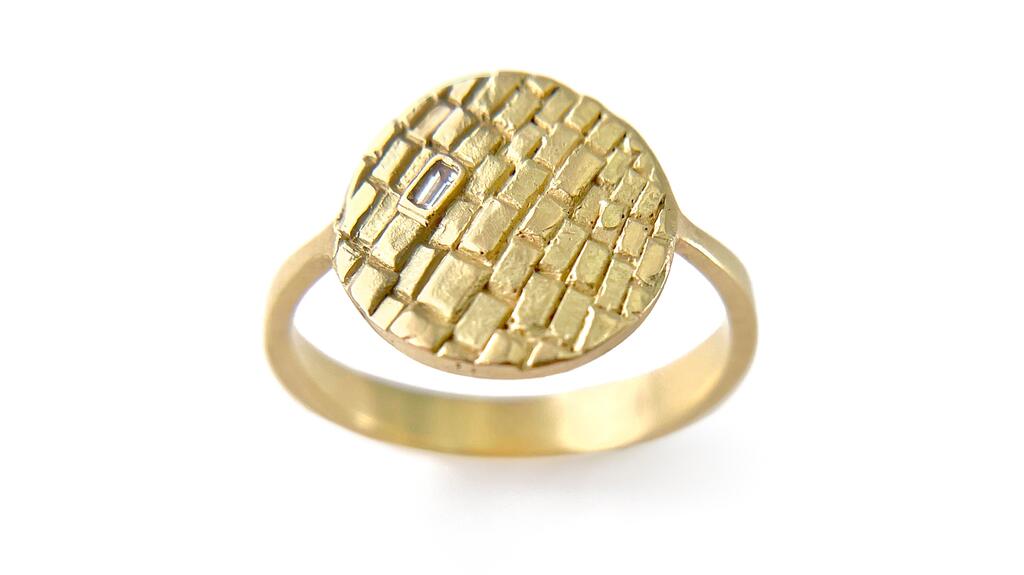
Laying them among actual sugar, she says she has found they can withstand the casting process and create a sparkling aspect to her pieces.
Simmen also uses lab-grown rough diamonds from Chatham, which mimic larger sugar crystals, like in her “Sugar Brick Disk” ring.
Designers are now choosing to work with lab-grown diamonds not because of their value but in spite of it. Even though the stones’ price is falling rapidly, creators view lab-grown diamonds as another innovative material to add to their repertoire.
Great jewelry masters take years, even decades, to create.
What is on their benches today is great insight into what is to come. The future is bright and full of possibilities.
The Latest

Guthrie, the mother of “Today” show host Savannah Guthrie, was abducted just as the Tucson gem shows were starting.

Butterfield Jewelers in Albuquerque, New Mexico, is preparing to close as members of the Butterfield family head into retirement.
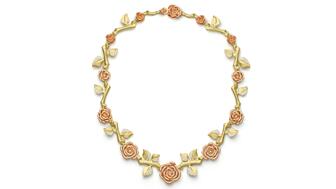
Paul Morelli’s “Rosebud” necklace, our Piece of the Week, uses 18-karat rose, green, and white gold to turn the symbol of love into jewelry.
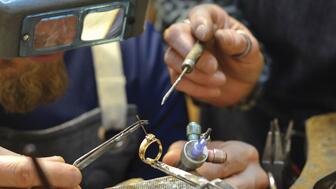
Launched in 2023, the program will help the passing of knowledge between generations and alleviate the shortage of bench jewelers.

The nonprofit has welcomed four new grantees for 2026.


Parent company Saks Global is also closing nearly all Saks Off 5th locations, a Neiman Marcus store, and 14 personal styling suites.
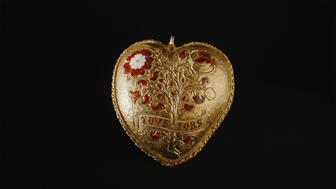
It is believed the 24-karat heart-shaped enameled pendant was made for an event marking the betrothal of Princess Mary in 1518.

Criminals are using cell jammers to disable alarms, but new technology like JamAlert™ can stop them.
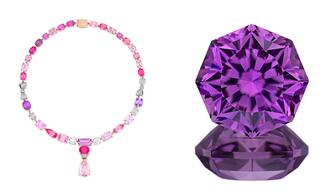
The AGTA Spectrum and Cutting Edge “Buyer’s Choice” award winners were announced at the Spectrum Awards Gala last week.
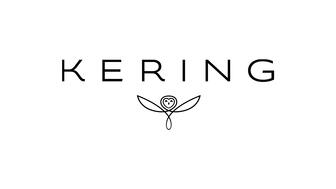
The “Kering Generation Award x Jewelry” returns for its second year with “Second Chance, First Choice” as its theme.

The clothing and accessories chain announced last month it would be closing all of its stores.

The “Zales x Sweethearts” collection features three mystery heart charms engraved with classic sayings seen on the Valentine’s Day candies.

The event will include panel discussions, hands-on demonstrations of new digital manufacturing tools, and a jewelry design contest.

Registration is now open for The Jewelry Symposium, set to take place in Detroit from May 16-19.
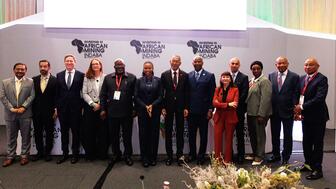
Namibia has formally signed the Luanda Accord, while two key industry organizations pledged to join the Natural Diamond Council.
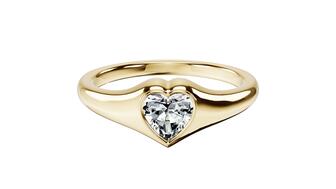
Jewelry is expected to be the No. 1 gift this year in terms of dollars spent.
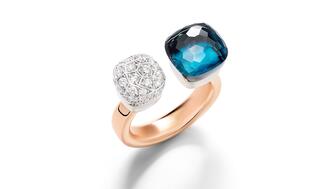
As star brand Gucci continues to struggle, the luxury titan plans to announce a new roadmap to return to growth.
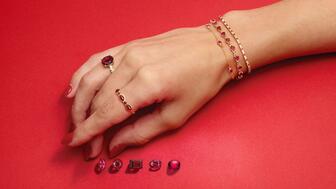
The new category asks entrants for “exceptional” interpretations of the supplier’s 2026 color of the year, which is “Signature Red.”
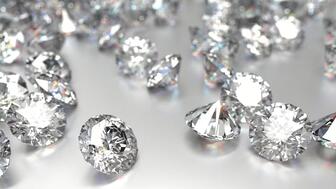
The White House issued an official statement on the deal, which will eliminate tariffs on loose natural diamonds and gemstones from India.

Entries for the jewelry design competition will be accepted through March 20.

The Ohio jeweler’s new layout features a curated collection of brand boutiques to promote storytelling and host in-store events.
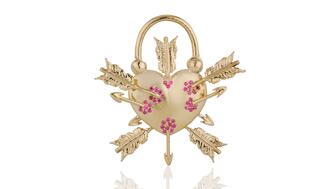
From heart motifs to pink pearls, Valentine’s Day is filled with jewelry imbued with love.

Prosecutors say the man attended arts and craft fairs claiming he was a third-generation jeweler who was a member of the Pueblo tribe.

New CEO Berta de Pablos-Barbier shared her priorities for the Danish jewelry company this year as part of its fourth-quarter results.
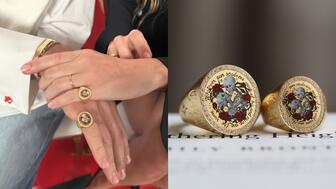
Our Piece of the Week picks are these bespoke rings the “Wuthering Heights” stars have been spotted wearing during the film’s press tour.
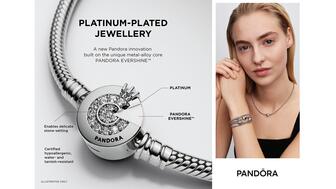
The introduction of platinum plating will reduce its reliance on silver amid volatile price swings, said Pandora.

It would be the third impairment charge in three years on De Beers Group, which continues to grapple with a “challenging” diamond market.















